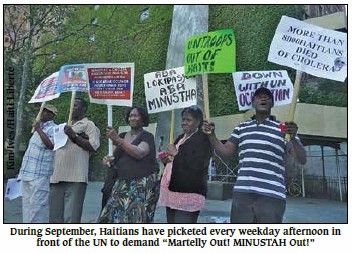|

For the past
three weeks, every weekday from 3 p.m. to 6 p.m., a handful of
Haitian demonstrators have held a picket-line in Ralph Bunche
Park, across the street from the UN’s General Headquarters in
Manhattan. The demonstrators hold up signs, give out flyers, and
talk to UN diplomats, workers, and passers-by. The essence of
their message is simple: “Martelly Out, MINUSTAH Out.”
Haitian President Michel Martelly is accused of massive
corruption and stands poised to dissolve Haiti’s Parliament in
January before it can impeach him. MINUSTAH is the acronym for
the UN Mission to Stabilize Haiti, an international UN force of
9,000 soldiers which has militarily occupied Haiti, in violation
of the Haitian Constitution and international law, for close to
10 years.
The pickets are building up to a larger all-day demonstration,
from 9 a.m. to 6 p.m., on Sep. 26, the day when President
Martelly is due to address the UN General Assembly. That
demonstration will take place at Dag Hammarskjold Plaza, located
on 47th Street between 1st and 2nd
Avenues in Manhattan.
The pickets and demonstration were called by a broad Haitian
community alliance which includes the Coalition to Support the
Haitian People’s Struggle (KAKOLA), the International Support
Haiti Network (ISHN), Haïti Liberté, and leading members of the
Lavalas Family party in New York.
Those organizations will join with other Haitian groups and
individuals on Sep. 26 who will also be demonstrating in Dag
Hammarskjold Plaza to call for the UN to pay reparations for the
cholera which Nepalese MINUSTAH soldiers introduced into Haiti
in October 2010. The resulting epidemic is the world’s worst,
having killed over 8,300 and sickened more than 680,000. Despite
legal actions against it, the UN has refused to admit
responsibility for unleashing the epidemic or to pay
reparations.
Below are excerpts from the flyer which picketers have been
handing out to people at Ralph Bunche Park, calling for
President Martelly to resign, and for UN troops to leave Haiti
immediately.
Two
Parliamentary Special Commissions of Inquiry have urged that
Haiti's lawmakers impeach President Michel Martelly and his
long-time business partner Prime Minister Laurent Lamothe.
Both men were in a July 11 meeting where they threatened Judge
Jean Serge Joseph, who was investigating corruption in the
regime. Martelly and Lamothe publicly lied that they were at the
meeting or ever met the judge, who died two days later from a
brain hemorrhage due to stress or poison.
Meanwhile, the Haitian Senate has unanimously demanded that the
9,000 soldier UN Mission to Stabilize Haiti (MINUSTAH) be
withdrawn no later than May 2014. The UN, however, wants to
renew MINUSTAH when its one year Security Council mandate ends
on October 15, 2013.
The Martelly regime illegally came to power in May 2011 after a
March 2011 electoral coup engineered by Washington (Haiti's
Electoral Council never ratified the election). It has carried
out a long list of illegal and provocative acts including: the
arrest of peaceful protesters, of a sitting deputy, and of the
plaintiffs in a suit against government corruption; the
unilateral, illegal taxing of international money transfers and
phone calls, proceeds from which go into an opaque
presidential-controlled account; the formation of several
private right-wing militias; the release or protection of known
criminals who are close to the President; and the ramming
through of Constitutional changes and an unlawful electoral
council.
But the wholesale corruption of the regime, at levels
breathtaking even by Haitian standards, is mainly what has
brought the people to a boiling point. Highlights include: a
$20,000 per diem for the President on his frequent trips abroad,
on which he takes his family and large entourages who are given
equally obscene per diems; 12 documented kick-back payments
totaling $2.6 million from Dominican Sen. Felix Bautista for
post-earthquake construction contracts; the siphoning off of
millions of dollars from the PetroCaribe fund set aside for
social programs; and the disappearance into thin air of another
$100 million in post-earthquake international funds for
rebuilding of a devastated Port-au-Prince neighborhood, which
still lie in shambles. The list goes on and on.
Meanwhile, MINUSTAH continues to repress, harass,
and infect the Haitian people at an average cost of about $800
million a year... |